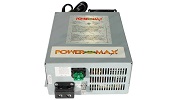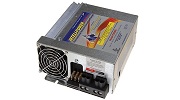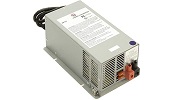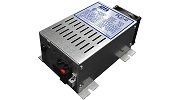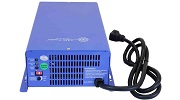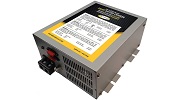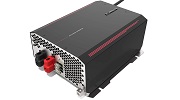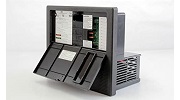Factory-supplied converters are often loud and inefficient. They can also destroy your expensive deep cycle batteries, costing you hundreds of dollars in replacements. So, why not replace your old bulk-charge-only converter with a new best RV converter? Not only will your RV be much more energy-efficient, you will also benefit from topped-up batteries that last much longer.
Replacing your RV converter is fairly straightforward. There are, however, a huge variety of models to choose from. Save yourself hours of research and head straight for the very best units in our top-rated RV converter reviews. We’ve also included a comprehensive buyer’s guide to help you make the right choice.
Table of Contents
- 1 What is an RV Converter?
- 2 Best RV Converter
- 2.1 Powermax PM3 Series RV Converter
- 2.2 Progressive Dynamics Inteli-Power 9200 Series
- 2.3 WFCO WF-9800 Series Deck Mount Converter Charger
- 2.4 IOTA Engineering Converter and Charger
- 2.5 AIMS Power Converter & Battery Charger
- 2.6 Go Power! Converter/Battery Charger
- 2.7 Furrion Power Converter for RV, Trailer or Camper
- 2.8 WFCO Power Center Converter Charger
- 3 Compare the Best RV Converter Charger
- 4 Buyer’s Guide to Buying the Best RV Converter Charger
- 5 Types Of RV Converters
- 6 What Are the Benefits of an RV Converter?
- 7 Power Converter vs Battery Charger
- 8 Power Converter vs Inverter
- 9 Top RV Converters Video
- 10 FAQ – Best RV Converters
- 11 Final Thoughts
What is an RV Converter?
There are two types of amperage draws in your RV, AC Amps for your appliances that run off 120V AC power and DC Amps for your appliances that run off 12V DC power.
If you hook up your RV to shore power without a converter, you will be able to run all of your AC appliances, such as your air conditioning, TV, microwave, coffee maker etc.
Your DC appliances, such as your lighting, water pump, furnace, for example, cannot run off AC power – so they would use the power supplied by your 12V DC house batteries.
Once your battery power has run out, without a converter, even though you’re plugged into shore power, you wouldn’t be able to run your DC appliances. To run your 12V DC appliances and recharge your batteries when you’re hooked up to an electrical supply you need an RV converter.
RVs come with a converter fitted as standard. They are an essential piece of kit that is necessary to convert AC power into DC power, keeping your batteries ready for use off grid and your DC appliances powered when you’re hooked up.
Best RV Converter
Here is our selection of the very best RV converters on the market. Wherever your needs, battery type, and budget, we’ve got all angles covered. Read on to find your perfect match right here.
- Powermax Pm3 Series RV Converter
Buy from AmazonRead Our Review
- Progressive Dynamics Inteli-Power 9200 Series
Buy from AmazonRead Our Review
- WFCO Deck Mount Converter Charger
Buy from AmazonRead Our Review
- IOTA Engineering Converter and Charger
Buy from AmazonRead Our Review
- AIMS Power Converter & Battery
Buy from AmazonRead Our Review
- Go Power! Converter & Battery Charger
Buy from AmazonRead Our Review
- Furrion Power Converter for RV, Trailer or Camper
Buy from AmazonRead Our Review
- WFCO Power Center Converter Charger
Buy from AmazonRead Our Review
Powermax PM3 Series RV Converter
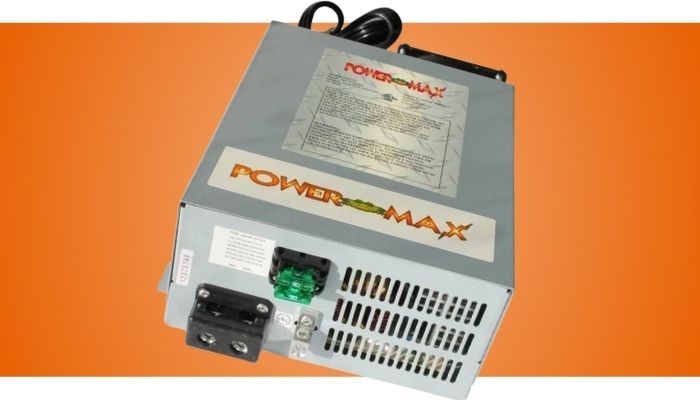
The Powermax PM3 Series RV Converter is available in a wide range of amperages, from 15 up to 120 Amps. They work with any battery type, to fully maintain and charge your batteries with clean DC power.
This 55 Amp unit features built-in three-stage smart charging to keep your batteries in great condition for longer. There is also a variable voltage output mode that can be set between 13 V DC to 16.5V DC, giving you full control over your converter to suit your needs and circumstances.
Thanks to its LED status indicator light you can easily check on your converter’s operation. Its efficiency rating of over 85% means you get more power out of your unit – ideal for using a large number of appliances simultaneously.
Numerous safety features ensure safe operation and enhanced protection for your expensive batteries, including a current limiting design that automatically shuts off power during an overload or short-circuit conditions. There is also built-in thermal protection, plus a temperature-controlled, quiet cooling fan.
Complete with integrated mounting flanges and a standard outlet 110/120V AC power cord, simply insert your battery charge wires into the unit’s junction terminal block and tighten for a very easy installation.
Taking its two-year warranty into account, this smart charging RV converter is an excellent buy for the money.
Progressive Dynamics Inteli-Power 9200 Series
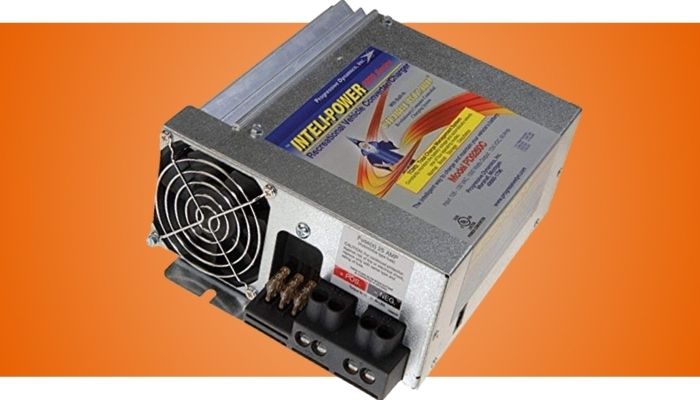
One of the most popular RV converters around, you’ll struggle to find a better model than the Inteli-Power 9200 Series by Progressive Dynamics. Made in the USA, this 60-Amp, high-quality solid-state RV converter provides a safe and reliable service that you can trust to prolong the life of your expensive deep-cycle batteries.
Thanks to its built-in Charge Wizard, your voltage status is constantly monitored for automatic battery management. It selects the appropriate charging mode from Boost, Normal, Storage or Equalization modes and can charge up your battery to 90% in just three to six hours. Prevent stratification and sulfation by installing one of these converters in your rig and save on expensive battery replacements.
Equipped with numerous safety protections, the Inteli-Power 9200 benefits from electronic current limiting to automatically reduce output when maximum capacity is reached. This protects the unit itself, along with reverse battery protection and high voltage protection, while the unit’s low line voltage protection keeps your appliances safe from damaging low voltage irregularities.
For quiet operation, especially at night-time, the 9200 Series RV Converter adjusts its temperature-operated fan speed to slow when demand is low. Automatic thermal protection reduces your converter output should the unit’s temperature exceed pre-set limits for safe operation and damage protection.
For safe and reliable filtered DC power for all of your 12V lighting and appliances, this model is by far one of the very best units around. Although it does cost a fair bit more than many others, its excellent battery Charge Wizard and two-year warranty make it well worth the extra cost.
WFCO WF-9800 Series Deck Mount Converter Charger
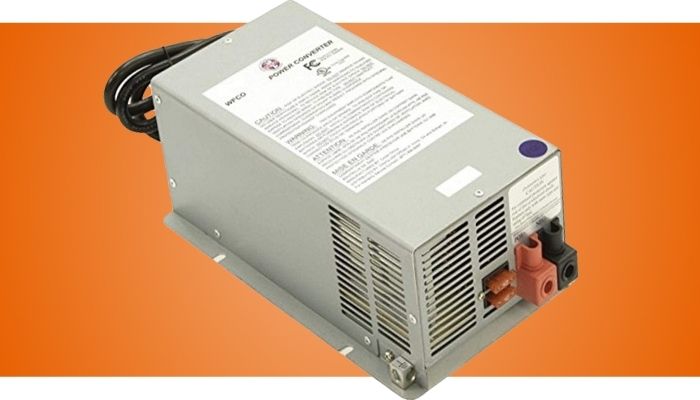
Available from 35-75 Amps, the WF9800 Series Deck Mounted Converter Chargers provide clean and reliable 12V power to your lighting and DC appliance circuits, even without filtering from a battery. Trusted by a huge number of RV owners, whether you are upgrading or simply replacing, WFCO is one of the market leaders in RV power conversion.
The WF-9855 model gives you a 55 Amp DC output, plenty for your DC appliances, as well as charging up your house batteries when you’re plugged into shore power. As an advanced three-stage converter charger, it automatically selects from three nominal voltage output modes to extend your battery lifespan – float, absorption or bulk charge.
In case of overload or short circuit conditions, electronic current limiting automatically shuts down the power. Temperature, reverse polarity, and overvoltage positions all ensure safe, optimal operation. As this model is FCC Class B compliant, you won’t have to worry about any interference to your TV, radio, or other signals, such as sensitive long distance communication radios.
Thanks to its open-top design, installation is very straightforward and easy to do yourself. There is a plug for your shore power 110V supply and easy to attach connectors for your wiring. The cooling fan only runs when needed for extra energy efficiency and quiet operation.
Made by a highly trusted RV power conversion specialist, if you are looking for an easy to install RV converter with a smart charging capacity to extend your battery life, this is a great model to go for. It also comes complete with a two-year limited warranty for your peace of mind.
IOTA Engineering Converter and Charger
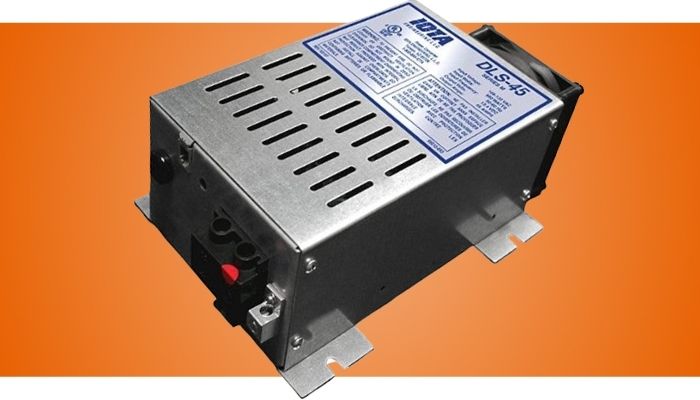
The DLS 55 Converter and Charger by IOTA Engineering supplies clean 12V power for your circuits, as well as charging up your house batteries. IOTA, originally pioneers in the lighting industry, rigorously test all of their products, implementing an extensive Quality Control program to ensure that they meet the very highest expectations.
The DLS-55 converts 108-132AC voltage to 13.4V DC for your DC load operation and 12V battery charging. It can supply up to 55 Amps to power your DC appliances, including your furnace, ceiling fans and water pump, with ease. As a battery charger, it delivers its full current when battery levels are sufficiently low to minimize battery stress. When your battery reaches full capacity, it drops the current to provide a float-charge and prevent self-discharge.
If you are thinking of purchasing this unit, it is well worth spending a small amount extra and getting the optional IQ4 Smart Charger with it. There are eight compatible versions that are each specially designed for a specific type of battery (gel, LIFEPO, AGM..) or charging style, such as parallel charging or on-demand bulk charging. If you are planning to change your battery type in the near future, you can simply change your IQ4 controller, thus futureproofing your converter purchase.
This RV converter can withstand low transient AC line voltage, as well as low operating temperatures. It also features plenty of built-in safety protections, including current limit, thermal, and overload protections. Fan noise is reduced thanks to its proportional fan control, with the fan only running when needed and at the lowest speed required.
AIMS Power Converter & Battery Charger
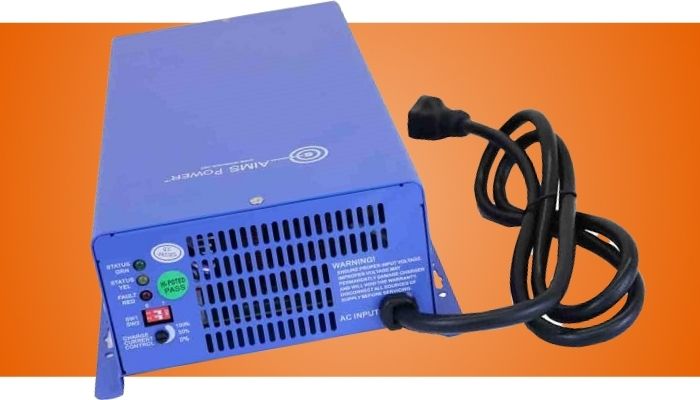
If you are looking for the very best RV converter, be sure to take a closer look at the Aims Power Converter and Battery Charger. This highly versatile model is suitable for use with both 12V and 24V setups, and can also deal with unstable power inputs thanks to its broad input range from 70V AC up to 145V AC.
Used as a 12V DC power converter it can supply up to 75 Amps, plenty enough for all of your lighting and DC appliances, as well as for charging up your house batteries. Its high 75-Amp capacity means that you can charge a 100-AH battery up to 90% in under one hour. It is also suitable for AGM, gel, open lead acid, and LiFePO4 batteries.
Ideal for full timers and large rigs with high energy needs, this three-stage RV converter uses smart charging technology to maximize your battery life with bulk, absorb, and float stages. You can also adjust the charge current via the control dial to safely charge smaller batteries at their recommended levels.
Complete with short-circuit and over-temperature safeguards, this unit features a smart fan that works permanently to optimize your converter’s performance. While it is not overly noisy, you may wish to opt for another model if you have oversensitive hearing and it’s located near to your sleeping quarters. Despite its always-on fan, this model still has good efficiency ratings of over 80%.
Very safe, the Aims Power Converter and Battery Charger is listed to UL 458 and CSA 22.2 and comes complete with reverse polarity, over-voltage, and under-voltage protections. Its superior performance and high capacity make this model a highly popular choice amongst big rig owners.
It also comes with a two-year manufacturer’s warranty and a reasonable price tag considering its excellent versatility.
Go Power! Converter/Battery Charger
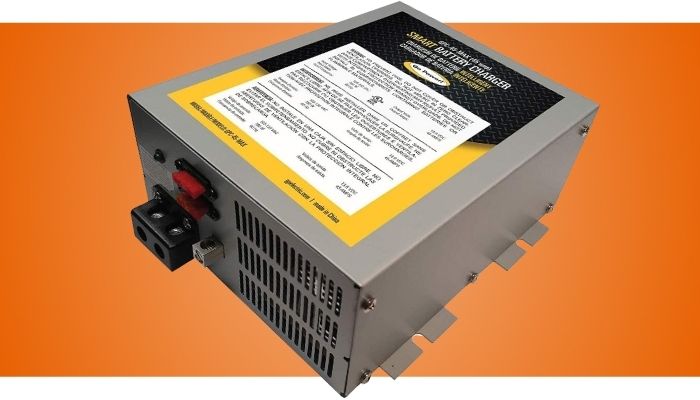
The Smart Battery Converter Charger by Go Power! Provides fast, reliable, and accurate charging, as well as 12V output, all at a reasonable price. Thanks to its lightweight, compact design, this model makes a popular choice for mid-sized RVs with its generous 45 Amp capacity.
Specifically designed for use with wet lead-acid batteries, this unit provides four-stage battery charging and can be used with banks of up to six batteries. The bulk stage provides maximum current to your battery, followed by the absorption phase, during which the charger holds your batteries at 14.4V.
When nearly completed, it switches automatically to the float stage with a lower voltage to avoid excessive gassing of your batteries. Lastly the equalize stage is used if you have two or more batteries to ensure even battery levels
Thanks to its small dimensions, you’ll have no difficulty installing this unit inside your RV and there is also a 15-Amp male plug included for an easy setup. UL-listed, this battery charger and converter is very safe and reliable. Multiple protection features include over-current, reverse battery polarity, and brown-out input protections.
To ensure quiet operation, the fan speed is directly proportional to the converter’s internal temperature. So, when you have lower loads at night, it makes less noise. With its typical efficiency rated over 85%, if you have several wet lead-acid house batteries, this unit makes a highly affordable model to keep them fully charged and equalized.
Furrion Power Converter for RV, Trailer or Camper
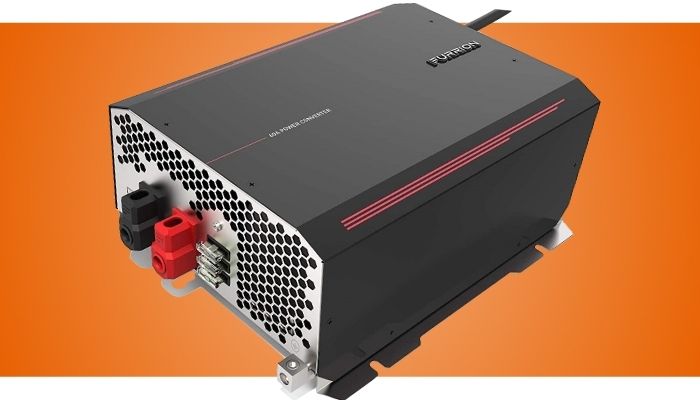
Suitable for charging up your Furrion LiFePO4 batteries, as well as standard lead-acid ones, the Furrion Power Converter is a smart battery charger. Benefitting from numerous modes to ensure that your batteries remain in prime condition, this 60-Amp model has a high capacity to also power your 12V appliances and lighting.
Rated over 80% efficient when used to charge up your LiFiPO4 batteries, this model features an advanced microprocessor to ensure that your batteries are automatically optimized. It constantly monitors your battery’s voltage and adjusts its output accordingly to both rapidly recharge and maintain your battery over long periods.
If you don’t use your RV all year round, you will be able to benefit from its float and standby modes that ensure that your battery stays fresh even during long periods of inactivity. Ideal for saving you time on battery maintenance, as well as money on replacement batteries.
This unit features numerous safety protections, including over-voltage, over-current, prothermal, and short-circuit protections to ensure greater reliability and safe, efficient operation. The intelligent cooling fan helps to keep noise levels right down, although note that using this model in temperatures over 122 degrees will result in derating.
Easy to install, the Furrion Power Converter makes a good choice for auto-charging your Furrion LiFiPO4 batteries. While it is also a good choice for extending the lifespan of traditional flooded cell lead-acid batteries, there are plenty of other models available at lower prices.
WFCO Power Center Converter Charger
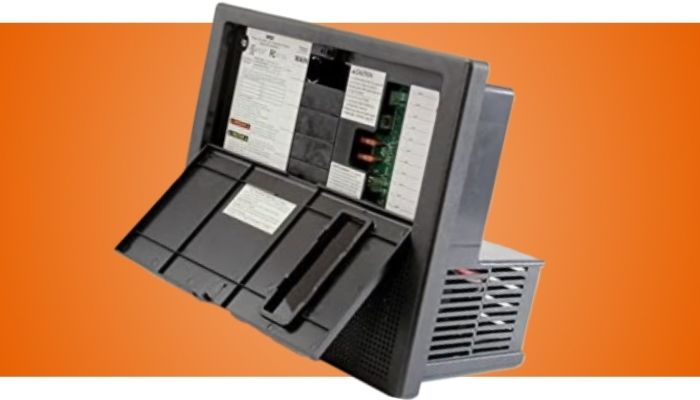
The WFCO Power Center Converter Charger provides 65 Amps of clean DC power for your 12V RV circuits and house battery charging. Thanks to its decorative doors, this unit looks smart, while its front-cooled fan means it doesn’t require any additional space for installation.
Your lighting and 12V circuits run off a clean, constant 13.6V DC nominal output for reliable and safe operation. For charging up your batteries, a three-stage process ensures a long battery lifespan and optimized performance levels. The 14.4V DC bulk charge mode rapidly recharges your depleted battery, followed by the absorption mode at 13.6V DC. Lastly, the float mode trickle charges you batteries to ensure they remain in prime condition.
Your electrical system and power center are protected by an automatic shutdown in case of overload or short circuit conditions, thanks to its electronic current limiting. With space for eleven DC circuits, this is a great choice for an upgrade to your RV electrics. It also benefits from LED warning lights, so you can easily identify any circuitry issues.
FCC Class B compliant, this RV converter does not cause any interference with TVs or radios. The cooling fan only runs when required for quiet, unobtrusive operation. Thanks to WFCO’s focus on high-quality control standards, this unit is extremely reliable and highly durable. It is also easy to install, taking up a minimum of space thanks to its quality components and space-saving design.
Compare the Best RV Converter Charger
| Image | Title | Price | Rating | Buy |
|---|---|---|---|---|
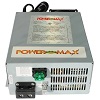 |
Powermax Pm3 Series RV Converter |
$$
|
Buy on Amazon | |
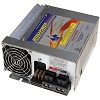 |
Progressive Dynamics Inteli-Power 9200 Series |
$$$$
|
Buy on Amazon | |
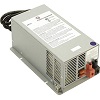 |
WFCO Deck Mount Converter Charger |
$$$
|
Buy on Amazon | |
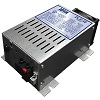 |
IOTA Engineering Converter and Charger |
$$$
|
Buy on Amazon | |
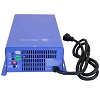 |
AIMS Power Converter & Battery |
$$$$
|
Buy on Amazon | |
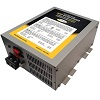 |
Go Power! Converter & Battery Charger |
$$$
|
Buy on Amazon | |
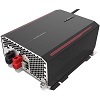 |
Furrion Power Converter for RV |
$$$
|
Buy on Amazon | |
 |
WFCO Power Center Converter Charger |
$$$$
|
Buy on Amazon |
Buyer’s Guide to Buying the Best RV Converter Charger
There’s plenty to bear in mind when choosing a new RV converter charger. To make sure that you choose the best model for your rig, here are some of the main points that you’ll need to consider.
| Some more great RV power guides |
|---|
| Pure Sine Wave Power Inverter |
| Best Lithium Generator |
| 50 Amp RV Surge Protector |
Price
Thankfully, RV converter chargers are fairly reasonably priced seeing as they are an essential piece of kit. While you can pick up budget models priced under $100, we recommend opting for the mid-priced range between $100-$200, or more depending on your needs.
As the saying goes, buy cheap, buy twice. There are plenty of RV extras and accessories where you can save big, however, when it comes down to the real essentials, especially all things electrical, we recommend choosing a high quality product even if that means spending quite a bit more.
A good quality RV converter will last you for years. It will also look after your house batteries much better than a cheaper model, saving you money on expensive battery replacements. In fact, spending that extra $100 on a decent converter will probably save you money on batteries in the long run.
So, when it comes down to choosing a new RV converter, if possible, don’t scrimp on the price and end up replacing it (and your batteries) sooner than necessary. At the end of the day, it just ends up being a false economy.
Input Voltage Range
This is the voltage that you will be supplying to your converter from shore power. So, you’ll just need to check that your model is suitable for standard US voltage of 110-120V.
Some RV converters have a much larger range, from around 70V up to around 140V. This can be useful if you are hooking up somewhere with a very unstable power input.
Output Voltage
Choose an output voltage that matches your batteries and RV DC circuits. In most cases this will be 12V, although there are some RVs with 24V setups. The output voltage is what your converter converts your shore power into – normally taking 110-120V AC and converting it to 12V DC.
Efficiency Rating
Converting electricity results in some energy loss to heat. While a certain amount of loss is inevitable, the greater the efficiency of your converter, the more available electricity you’ll have to run your appliances.
What’s more, the less efficient your model is, the greater the amount of heat that will be produced. This will result in your converter needing to dissipate this heat with a cooling fan, or to even instigate a thermal shutdown.
Your Rig’s Appliances
Before you think about purchasing a new converter, make sure you list all of your 12V DC appliances in your rig. Then think over what items you are likely to have on at the same time to come up with an average ballpark figure for your needs.
If you’re doing a major RV renovation and have added new appliances, you may need to change out your wiring if you are thinking of investing in a higher capacity converter.
To help you out, here are some common 12V DC appliances with their average draws:
- Light (porch, aisle, overhead) – 1 Amp per light
- Furnace – 10-12 Amps
- Refrigerator (LP gas) – 2 Amps
- 12V TV – 5 Amps
- Ceiling fan – 4 Amps
- Water pump – 4 Amps
Obviously, your exact models will vary, so be sure to check out your actual needs. Your converter’s capacity in Amps represents the total draw of 12V appliances and battery charging that it can simultaneously handle.
45 Amp and 60 Amp versions are popular models suitable for charging large batteries rapidly, as well as powering your 12V DC circuits when you’re plugged into shore power.
No Load Power Consumption
Even if your batteries are fully charged and you are not running any 12V appliances or lighting, your converter will still use a small amount of energy. High energy-efficient models will use the lowest amount of power.
If you are likely to be in situations where you have a limited mains power supply, you’ll want to look for RV converters with the lowest no load power consumption levels.
Safety Features
We recommend choosing a reputable RV electronics brand that has multiple safety features. Here are some of the most common safety features that you’ll want to see included built-in to your new RV converter:
- Over and under voltage protection
- Overheating protection
- Electronic current limiting
- Reverse battery protection
- Short circuit protection
Types Of RV Converters
Here are the most popular types of RV converters on the market, check out which type is the best for your rig and battery-charging needs.
Multi Stage Or Smart Converter
Multi-stage RV converters, also known as smart or intelligent converters, are designed to keep your batteries in prime working order.
Unlike old fashioned one-stage RV converters that simply charge up your batteries at one flat rate, multi-stage models detect your battery level and adapt their voltage accordingly.
Most smart converters feature three distinct charging phases. Firstly, a bulk charge stage where your converter detects your depleted battery levels and charges them rapidly back up at a high voltage.
Then comes the absorption phase at a slightly lower voltage, tailing off towards full charge. Lastly, the float stage trickle charges your battery, keeping it topped up as needed.
Multi-stage converters are essential for long lasting batteries. They can keep your batteries topped up and ready to go during storage periods, as well as minimizing the need for any battery maintenance.
High Output Converter
If you have a large battery bank then you will need a high output converter. The same is also true if you have any large appliances running off your DC circuits.
High output converters will enable you to keep your large battery packs sufficiently topped up, as well as being able to run all of your 12V DC appliances when plugged into shore power.
If you frequently take trips off-grid, you may want to look into extending your battery capacity and investing in a high output converter.
Deck Mount Converter
A deck mount converter gives you much more flexibility when it comes down to installing your converter. Popular with RV remodels, deck mounted versions can be installed in various locations within your RV, such as beneath your counters or wall mounted.
Distribution Panel Converter
If your RV is getting on a bit and you want to upgrade its converter, then a distribution panel converter makes for an easy switch. Often you will find exact panel replacements with new updated high performance converters.
This will keep your interior unchanged, but with a new highly efficient converter that will extend your battery lifespan.
What Are the Benefits of an RV Converter?
There are plenty of benefits to upgrading your RV converter to a newer model. Here are the main benefits of installing a new RV converter.
Protection against Battery Draining – Your converter will keep your batteries topped up, so you won’t have to worry about self-discharge. Multi-stage converters use a float phase to ensure that your batteries are fully charged, so you’ll be ready to get the most out of your trips off grid.
Even Power Distribution – RV converters supply clean, safe DC power. Thanks to their numerous safety protections and automatic shut down systems they protect your RV electrical circuits and give you a reliably even 12V DC distribution for all of your DC appliances.
Seamless Power Supply – By continuously charging up your house batteries, when you decide to hit the road, your fully charged batteries give you a seamless power supply.
So, whether you’re hooked up to shore power or stopping off en route to your next campground, you can still use your lights, run your refrigerator, and benefit from running water.
Long-Lasting Battery – Today’s RV converters are specially designed to take care of your batteries. Upgrading your old, one-stage converter to a multi-stage version will ensure that your batteries last for much longer with less maintenance required.
As we all know, batteries are very expensive, so this is definitely one really important advantage that could even enable you to increase your power bank capabilities, rather than replacing like for like every couple of years.
Safety of Electrical Appliances – A new converter will ensure that all of your 12V DC appliances run smoothly. RV converters utilize proven electrical mechanisms to ensure safe operation and a steady power source.
Numerous safety protections are integrated to ensure an automatic shutdown in the event of any issues, protecting your appliances, circuitry, and RV.
Power Converter vs Battery Charger
Now that you know all there is to know about RV converters, you may be wondering what is the difference between a power converter and a battery charger.
First of all, a power converter is used to convert shore power, AC to DC, so that you can power up your RV’s 12V DC appliances, as well as charging up your battery.
Aside from converting shore power for use in your RV DC circuits, your power converter will also charge up your batteries much faster than a standard battery charger. Power converters are specifically designed nowadays to provide multi-stage charging functionality. This protects your battery from overcharging and keeps it topped up from self discharging.
Battery chargers, aside from their very long charge times, tend to perform one stage charging. If you leave your RV batteries plugged in to a battery charger for a substantial length of time, they will suffer from a reduced lifespan and diminished capacity.
Power Converter vs Inverter
The words inverter and converter are easily mixed up. What’s more, both appliances convert electricity from one form to another. Here are the essential points.
RV converters
Convert shore power (110-120V AC) to battery power (Normally 12V DC).
Can be used to recharge your house batteries when plugged into mains power.
Also allow you to run your 12V DC RV appliances when plugged into an electrical hook up. For example, your lighting, water pump, refrigerator etc. Any appliance that runs off your 12V DC circuits will need a converter to run off mains AC power.
RV inverters
Convert your DC battery power (usually 12V) into 120V AC power. This enables you to run your AC powered appliances off grid using your RV batteries. AC powered appliances are any items that you could plug into a bricks and mortar home – your microwave, computer, coffee maker, AC etc.
Your inverter uses your battery power which it depletes, whereas a converter uses shore power to replenish battery power.
Top RV Converters Video
FAQ – Best RV Converters
Are you considering upgrading or replacing your RV’s converter? Or perhaps you’re a new RV owner looking to understand the importance of a converter and how it works? In this Frequently Asked Questions (FAQ) section, we address common queries about RV converters to help you make informed decisions about this essential component of your RV’s electrical system.
From understanding the role and functionality of an RV converter to selecting the right one for your needs, we’ve compiled answers to the most commonly asked questions. Whether you’re a seasoned RVer or just starting your journey, this FAQ section will provide valuable insights into choosing the best RV converter for your rig.
We cover topics such as the importance of RV converters, their working mechanism, key features to consider when purchasing, installation considerations, upgrading options, signs for replacement, differences between converters and inverters, and average price ranges. By exploring these questions, you’ll gain a better understanding of RV converters and be well-equipped to make informed decisions regarding your RV’s electrical system.
If you have additional questions that are not covered in this FAQ section, we encourage you to reach out to a trusted RV professional or refer to your RV manufacturer’s guidelines. Now, let’s dive into the frequently asked questions about the best RV converters and discover the key factors to consider when making your selection.
What is an RV converter and why is it important?
An RV converter is a device that converts 120-volt AC power from a campground or generator into 12-volt DC power to run your RV’s electrical systems and charge the house batteries. It plays a crucial role in providing reliable power to your RV’s appliances and ensuring your batteries stay charged while you’re on the road.
How does an RV converter work?
An RV converter works by taking the incoming 120-volt AC power and converting it to 12-volt DC power. It uses a series of diodes and transformers to achieve this conversion. The converted power is then distributed to various circuits in your RV, powering lights, water pumps, fans, and other DC-powered appliances.
What are the key features to consider when choosing an RV converter?
When selecting the best RV converter for your needs, consider the following key features:
- Power output: Ensure the converter can deliver enough power to meet your RV’s electrical demands.
- Charging capabilities: Look for converters with built-in smart chargers that can efficiently charge your RV’s house batteries.
- Compatibility: Check that the converter is compatible with your RV’s electrical system and battery type.
- Noise level: Look for converters that operate quietly to avoid unnecessary noise inside your RV.
- Efficiency: Consider converters with high efficiency ratings to minimize power loss during the conversion process.
- Safety features: Look for converters with features like surge protection, reverse polarity protection, and overcharge protection.
Can I install an RV converter myself, or do I need professional help?
If you have basic electrical knowledge and feel comfortable working with electrical systems, you can install an RV converter yourself. However, if you’re unsure or unfamiliar with electrical work, it’s recommended to seek professional assistance to ensure proper installation and avoid any potential safety hazards.
Can I upgrade my RV’s converter?
In most cases, you can upgrade your RV’s converter to a more efficient or higher-capacity model. However, before making any upgrades, it’s essential to check your RV’s electrical system and battery requirements to ensure compatibility. It’s also advisable to consult the manufacturer’s guidelines or seek professional advice to make sure the upgrade is done correctly.
How often should I replace my RV converter?
The lifespan of an RV converter can vary depending on factors such as usage, maintenance, and the quality of the unit. Generally, RV converters can last several years. However, if you notice any issues with power delivery, charging capability, or signs of damage, it may be time to consider replacing the converter. Regular inspections and routine maintenance can help prolong the life of your converter.
Are RV converters the same as inverters?
No, RV converters and inverters are not the same. While converters convert 120-volt AC power to 12-volt DC power, inverters do the opposite by converting 12-volt DC power from the RV’s batteries to 120-volt AC power. Inverters are typically used to power AC appliances when the RV is not connected to a shore power source or generator.
What is the average price range for RV converters?
The price of RV converters can vary depending on the brand, features, and power capacity. On average, you can expect to find RV converters ranging from $100 to $500 or more. Higher-end models with advanced features may be more expensive. It’s important to balance your budget with the required features and quality when making a purchase decision.
Remember to consult product manuals, manufacturer specifications, and customer reviews before making a final decision on the best RV converter for your specific needs.
Final Thoughts
With so many excellent RV converters on the market at highly competitive price points, there has never been a better time to improve your RV electrics and extend your house battery lifespan. A good RV converter will make your RV much more energy-efficient and could save you a lot of money on new batteries for boondocking.
All of the RV power converters in our selection are highly rated, dependable models from specialist manufacturers. If you are still struggling to make up your mind which RV converter is best for your rig, then why not take another look at one of our favorites, the Progressive Dynamics Inteli-Power 9200 Series. One of the best models around, it features a built-in Charge Wizard to protect your batteries and ensure an extra-long lifespan. Capable of charging your battery up to 90% in just three to six hours, this model is also highly reliable, quiet and very safe.
Looking to extend the life of your flooded lead-acid batteries with a compact, inexpensive RV converter? Then the GoPower!Converter and Battery Charger makes a good budget choice. Thanks to its four-stage battery charging process, it is also a great option for large battery banks.
If you are looking for a premium high output RV converter, the Aims 75 Amp Power Converter and Battery Charger is an excellent choice. It has a broad input voltage range, ideal for unstable power inputs. Capable of charging a 100Ah battery up to 90% in under one hour, whether you have an extensive battery set up or a lot of DC appliances, this model is one of the very best around and is suitable for AGM, open lead-acid, gel, and LiFePO4 batteries.
